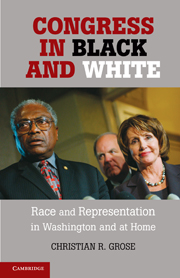Book contents
- Frontmatter
- Contents
- List of Figures and Tables
- Acknowledgments
- 1 African-American Legislators, African-American Districts, or Democrats?
- 2 A Unified Theory of African-American Representation in Congress
- 3 The “Hollow Hope” of Civil Rights Change in the U.S. House
- 4 Location, Location, Location
- 5 Constituency Service in the District
- 6 Bringing Home the Bacon
- 7 The Future of Racial Redistricting
- Appendix 1 Methods Used to Measure the Civil Rights Issue Space
- Appendix 2 Methods for Qualitative Research
- Appendix 3 Data, Methods, and Models for Project Allocations to African Americans
- References
- Index
Appendix 3 - Data, Methods, and Models for Project Allocations to African Americans
Published online by Cambridge University Press: 03 May 2011
- Frontmatter
- Contents
- List of Figures and Tables
- Acknowledgments
- 1 African-American Legislators, African-American Districts, or Democrats?
- 2 A Unified Theory of African-American Representation in Congress
- 3 The “Hollow Hope” of Civil Rights Change in the U.S. House
- 4 Location, Location, Location
- 5 Constituency Service in the District
- 6 Bringing Home the Bacon
- 7 The Future of Racial Redistricting
- Appendix 1 Methods Used to Measure the Civil Rights Issue Space
- Appendix 2 Methods for Qualitative Research
- Appendix 3 Data, Methods, and Models for Project Allocations to African Americans
- References
- Index
Summary
The analyses in Chapter 6 of project allocations to predominately black counties and to historically black colleges and universities (HBCUs) are based on four regression models. The figures displayed and discussed in Chapter 6 are predicted values based on varying the key independent variables of interest while holding the other “control” variables at their means. This appendix presents the details of these four statistical models in more depth than in Chapter 6. I examine four regression models, with four different dependent variables, all measuring either the number or dollar amounts allocated to either predominately black counties or HBCUs. The data used in Chapter 6 for the dependent variables are from the Federal Awards Assistance Data System (FAADS), which is discussed in detail in Stein and Bickers (1995). Other details regarding the unit of analysis were given in the text of the chapter.
The FAADS data are available from the U.S. census bureau as a list of every project allocated with associated geographic information. For Chapter 6's analyses of project allocations to predominately black counties and to HBCUs, I excluded all types of federal assistance other than project grants – formula-based grants, loans, contingent financial aid, and so on were not included. Project grants, and not these other forms of assistance, are the most likely to be particularistic to constituencies.
- Type
- Chapter
- Information
- Congress in Black and WhiteRace and Representation in Washington and at Home, pp. 197 - 214Publisher: Cambridge University PressPrint publication year: 2011



